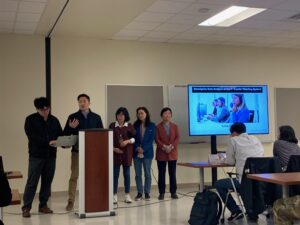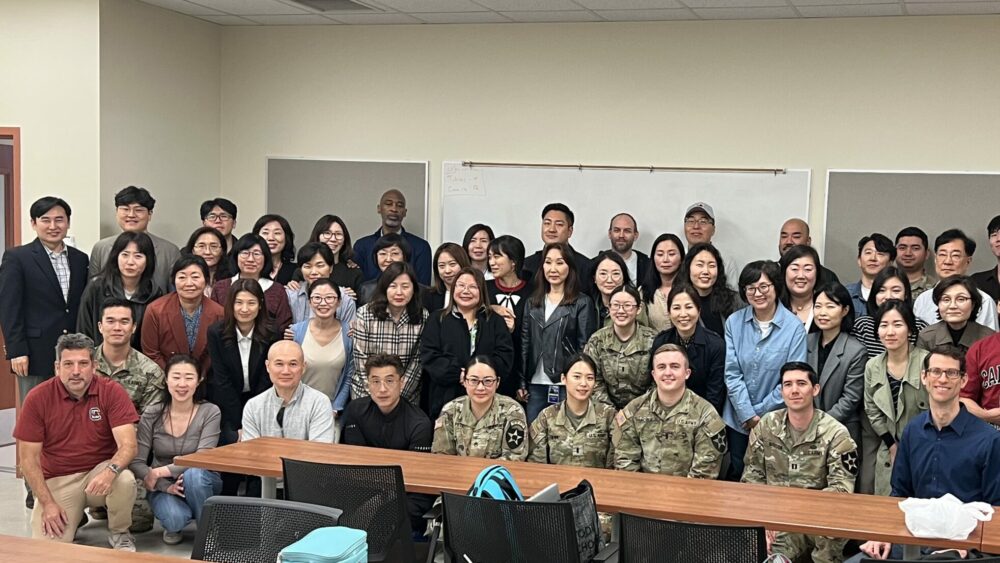“Oh, East is East, and West is West, and never the twain shall meet,” wrote Rudyard Kipling.
But that was a long time ago, and the world has changed. In fact, the Darla Moore School’s Executive Education program has already traveled to the Far East twice this year, bridging cultural gaps, but more importantly, bringing U.S. military personnel and civilian employees up to speed on how to better use financial data.
This time, for eight days in late April, we undertook what Associate Dean Mark Cecchini called a “whirlwind” journey to Korea. The mission was similar to one in January that took the team to Camp Zama in Japan – to teach our Business Analytics course. But there were differences as well, new challenges to tackle in teaching a well-known program on the far side of the world.
We’ve been teaching the Business Analytics class, a big part of our growing Government and Military Solutions program, here at home for years, to Fort Jackson soldiers and civilian personnel. The Army needs sophisticated data analysts in this century, and ExecEd has been meeting that need since 2014.
The course has gone mobile because it was inconvenient to send that many people from Asia to Columbia for a five-day course, and the 13-hour time difference made a virtual class impractical.
This time, the ExecEd team was on a tighter schedule. In Japan, they’d had a couple of days to look around the country and get over their jet lag. This time, they arrived in Seoul on Sunday morning, rode straight to the base an hour and a half away, and started teaching the next morning.
 The setting was impressive – United States Army Garrison-Humphreys, or as it is more simply known, Camp Humphreys. Located near Anjeong-ri in South Korea, about 47 miles from Seoul, it is a big and busy place. In fact, it is THE largest U.S. military overseas base in the entire world. Camp Humphreys is the headquarters for the Eighth U.S. Army, the Second Infantry Division, the Army’s most active airfield in the Pacific, and the hub of U.S. Forces Korea.
The setting was impressive – United States Army Garrison-Humphreys, or as it is more simply known, Camp Humphreys. Located near Anjeong-ri in South Korea, about 47 miles from Seoul, it is a big and busy place. In fact, it is THE largest U.S. military overseas base in the entire world. Camp Humphreys is the headquarters for the Eighth U.S. Army, the Second Infantry Division, the Army’s most active airfield in the Pacific, and the hub of U.S. Forces Korea.
There were a lot of students – too many for one classroom. So the group was broken up into two classes, across the hall from each other, 30 students in one and 25 in the other. “I’d do the morning on one side, then switch off” and move to the other side, said Mark.
He was joined by two other faculty members – Joel Wooten, an associate professor in the Moore School’s Department of Management Science, with whom Mark has taught the course many times, and a new teammate, Sung-Hee “Sunny” Park, managing director of the Moore School Data Lab.
Sunny was tapped for this course to make sure the students were given enough support during hands on exercises. Sunny speaks Korean, which helped out tremendously with the Korean nationals taking the course. But he brought more than that. While overqualified to be an assistant in such a course, it made sense for this one.
“We are fortunate that the folks at Camp Humphreys trusted us to make this a worthwhile experience for their students,” said Mark. “Knowing the class was larger, we wanted to make sure we could efficiently support students with all manner of technical and analytics project-related issues. While Joel and I are old pros at this course, Sunny was able to smooth out the experience by helping answer questions and solve problems quickly.”
“And one thing I didn’t anticipate before we left was how good a host Sunny would be,” he added. “He helped us get around South Korea smoothly, and showed us as much culture as we could fit in during the busy week.”
Next, Sunny will be teaching our new Business Analytics Certification to Army students, May 15-19.
There were a few technical and other challenges arising from teaching in a new venue. “When you go into classes you don’t control and want to give the ExceEd experience, it’s a little extra work,” said Mark.
But adjustments were made in real time and it all came together, and worked. “At the conclusion of the first day, the three of us rearranged the tables in both classrooms to be more team-friendly. It took us about 45 minutes, but it made a huge difference.”
Mark and his teammates were pleased. And senior officers who observed the group presentations on the last day seemed favorably impressed as well. Most importantly, the students benefitted, and not only the ones in uniform. At the end, a couple of the Korean civilians wanted to know how they might take some other ExecEd courses, which they had learned about from our website.
Finally, at the end of the week, the group got to look around for a few hours, and visit “seven or eight cool places” in the Seoul area. Then Mark and Joel flew back the next day, while Sunny stayed for a day or two to spend time with his folks.
Mark hopes to do this sort of thing on a more regular basis, and that looks promising, although nothing is official as yet. Meanwhile, classes for Army people stationed stateside continue here at the Moore School.
And since we started traveling abroad, word is getting around, and there is some interest right here in the U.S. for the mobile team. “Some units would prefer to keep their groups together, and like the in-person experience,” said Mark. “In many cases, it is more cost-effective to fly out two instructors than it is to send 20-30 students to us. As our goal is to support Army data proficiency, we are happy to travel anywhere to make that happen.”



Comments are closed.